
Supporting global communities in making sense of risk
A blog from Padmini Ravi, Project Manager – Risk Know-How, Sense about Science.
This page is approximately a 4 minute read
This page was published on

Each year, contaminated food causes over 600 million cases of preventable illness.
Have you ever thought about how the food on your plate is produced, where it came from, and the journey it’s been on? As a consumer living in the UK, I can trust that the food I buy at the supermarket, farmers market or consume in a restaurant has been safely produced. Consumers in wealthier countries don’t generally have to think twice on whether a food product is safe to eat or not, with most cases of food poisoning resulting from the improper storage or cooking in the home.
However, countries such as the UK are very much the outlier when you look at food safety in the majority of countries globally. Each year, contaminated food causes over 600 million cases of preventable illness, with there being 420,000 deaths worldwide. The impacts of inadequate food safety are disproportionately felt by individuals and governments in Low- and Middle-Income Countries (LMICs). In particular the poorer citizens in these countries, who are heavily reliant on informal markets and street vendors for their food security and where there is little, if any, in terms of domestic regulation and inspection to ensure basic hygiene standards are met.
Foodborne disease has typically been a lower priority for many international development organisations, compared to other diseases such as malaria and HIV, though this is slowly starting to change. Four of the seventeen 2030 Sustainable Development Goals relate to efforts to improve food safety for every global citizen, irrespective of economic status and circumstance.
Historically, food safety initiatives have largely served the interests of wealthier nations, for example, any training and capacity building support from wealthier countries to LMICs has been focused on export markets in these countries. Due to the contribution of exports to a country’s economy there has been a tendency for food safety policy and capacity in LMICs to have focused on export markets at the expense of improving outcomes for domestic consumers. Whilst at lot of good work has been undertaken on export supply-chains, these programmes should be aggressively scaled to include domestic markets as well.
The COVID-19 pandemic has been a great disrupter for global society, it has also shown that global food chains are only as strong as their weakest link, and that it is in every person’s interest to ensure resilient and safe food systems. The phrase ‘building back better’ has been widely used by policy-makers, and to achieve more equitable food safety outcomes will require sharing of knowledge, skills and technology with LMICs.
In order to help prioritise global efforts, having a good understanding of the evidence of the impact of current food safety programmes will allow improvements to be made on future food safety interventions. This will also ensure that finite resource has maximum impact, and there is no duplication of effort by key institutions involved in food safety programmes such as the FAO, WHO and World Bank.
RS Standards have been commissioned by the Foundation to undertake research on food safety education programmes globally, to better understand food safety course curriculums, training, delivery and impact, with a particular focus on LMICs. This will provide needed context to organisations wanting to make a difference in food safety education, by highlighting areas of strengths and opportunities in the current landscape. It will also help the Foundation to build on its work with the FAO, developing a higher-education food safety curriculum for the Caribbean and East Africa.
Whilst wealthier countries are fortunate to have high food safety standards, that is not to say that there still isn’t room for improvement. Key food safety principles that are universally applicable1, have to be continued to be embedded in the culture of businesses (and households for that matter) to ensure food safety outcomes continue to improve in all countries.
Disclaimer: all blogs featured are the views of the author and not representative of Lloyd's Register Foundation.
The core messages of the Five Keys to Safer Food are: (1) keep clean; (2) separate raw and cooked; (3) cook thoroughly; (4) keep food at safe temperatures; and (5) use safe water and raw materials.